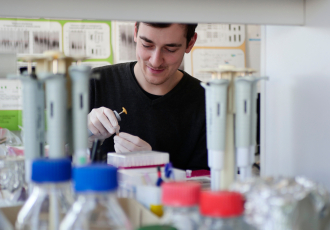27. Feb. 2025
Scientists from Jiří Fajkus’s research group at CEITEC Masaryk University, in collaboration with the Institute of Biophysics of the Czech Academy of Sciences and the Karlsruhe Institute of Technology, have discovered that Arabidopsis thaliana plants are surprisingly resilient to large-scale genome rearrangements. Using the CRISPR/Cas method, they modified the structure of plant chromosomes to test how such changes affect plant growth, gene activity, and genetic stability. The results showed that despite these extensive rearrangements, the plants maintained a normal phenotype and genetic stability.
In collaboration with German colleagues from Professor Holger Puchta’s laboratory, the researchers used advanced genetic engineering techniques to rearrange chromosomes in plants. They introduced breaks at specific sites, known as breakpoints, and then relocated chromosome segments between different chromosomes that do not normally share genetic information. The breakpoints were carefully chosen to avoid direct damage to the genes. The researchers then examined whether these rearrangements affected plant functions—such as gene activity, chromatin structure (which helps with the organization of DNA within the cell nucleus), or the length of telomeres, which protect chromosome ends and contribute to the cellular stability.
A surprising finding of the study, published in The Plant Journal, was that relocating large chromosome segments had only a minimal effect on gene activity, including genes located near the breakpoints. Out of more than 11,000 analysed gene transcripts, changes in their levels were detected in only a small percentage of genes, and these variations were scattered throughout the whole genome. This suggests that the plant genome is not only stable against physical changes in chromosome structure but also capable of regulating gene activity to prevent major deviations. "Our study shows that the plant genome is unexpectedly robust. The relocation of chromosome arms, which could theoretically disrupt gene regulation or cause developmental defects, had almost no impact in practice. The modified plants grew just like those with unaltered genomes, and their genetic function remained intact," explains the study’s first author, Ondřej Helia from CEITEC MU.
 Another part of the analysis focused on telomere length changes. Telomere length is a crucial factor for maintaining chromosome stability. The results showed that telomeres remained stable even after being relocated to a different chromatin environment, on another chromosome. "We expected that moving telomeres to a new location in the genome could affect their stability. Although the factors influencing telomere length are not yet fully characterized, it is believed that the surrounding DNA also plays a role. However, our results showed that even after extensive genomic rearrangements, the plants maintained telomere length balance. This suggests that if surrounding DNA indeed regulates telomere length, the relocated segments were large enough to retain their original function at the new site," says Miloslava Fojtová, the research leader.
Another part of the analysis focused on telomere length changes. Telomere length is a crucial factor for maintaining chromosome stability. The results showed that telomeres remained stable even after being relocated to a different chromatin environment, on another chromosome. "We expected that moving telomeres to a new location in the genome could affect their stability. Although the factors influencing telomere length are not yet fully characterized, it is believed that the surrounding DNA also plays a role. However, our results showed that even after extensive genomic rearrangements, the plants maintained telomere length balance. This suggests that if surrounding DNA indeed regulates telomere length, the relocated segments were large enough to retain their original function at the new site," says Miloslava Fojtová, the research leader.
The researchers also examined chromatin structure—the way DNA is "packaged" within the cell, and how this organization affects gene activity. Histones, specialized proteins that help organize DNA in the nucleus and regulate its accessibility for gene activation or silencing, play a key role in this process. Again, the results showed that despite chromosome rearrangements, chromatin organization remained largely unchanged. This confirms that plants can maintain the function and regulation of their genetic information even after extensive chromosome rearrangements.
These findings are not only crucial for understanding the mechanisms that maintain genome stability in plants but may also have potential practical applications in agriculture and plant breeding. "If chromosome structure can be precisely modified without negatively affecting plant growth or genetic stability, this opens the door to developing more resilient crop varieties that can better withstand environmental stress. Our study demonstrates that plants have an extraordinary ability to adapt," concludes Miloslava Fojtová.


 Share
Share



